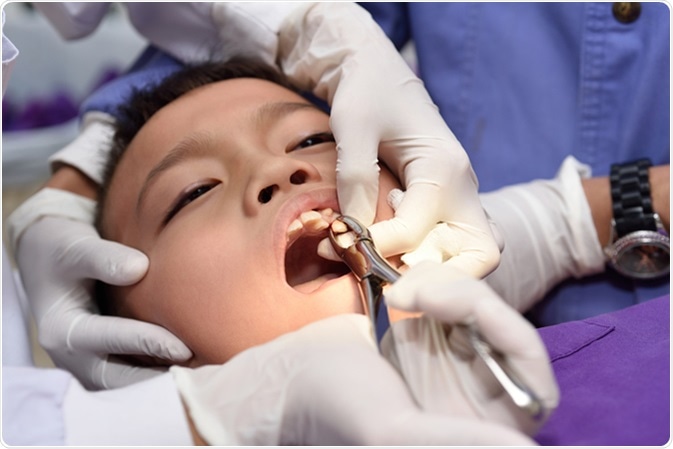There are several risks and complications of a tooth extraction that may affect some patients who need to have a tooth removed.
Post-surgical risks
Tooth extraction is associated with several general post-surgical effects such as pain, inflammation, bruising, bleeding, and infection.
Some pain, swelling, and bruising in the area can be expected for most patients, which will subside with time. Anti-inflammatory and analgesic medications can help to manage these symptoms in the meantime. Continued bleeding and infection of the area are less common and may require further management if they occur, such as treatment with antibiotics for an infection.
 Boy during dental extraction. Image Credit: ARZTSAMUI / Shutterstock
Boy during dental extraction. Image Credit: ARZTSAMUI / Shutterstock
Depending on the type of tooth extraction, either a local or general anesthetic is usually used to help reduce the pain associated with the procedure. The anesthetic that is used can also be associated with other risks, such as damage to the mouth, nausea, and dizziness. There is also a small risk of death with general anesthesia, which is estimated within the range of 1 in 100,000 to 200,000 cases.
Improper teeth alignment
Following the extraction of a tooth, the remaining teeth may move, leading to misalignment of the teeth and changes to the bite. This can then go on to cause damage to the other healthy teeth in the mouth, which may require further dental work.
This can usually be prevented by implementing techniques to compensate for the missing tooth. For example, the other teeth can be moved orthodontically, or the removed tooth may be replaced with a dental implant, bridge, or denture.
Bite collapse
For some patients, particularly those who have had several back teeth removed, the collapse of the bite may occur. This is also known as a loss of vertical dimension of occlusion and involves rotation of the lower jaw closer to the upper jaw. As a result, changes in the muscle contractions needed to chew can present and eventually lead to symptoms such as dry, chapped, or cracked lips.
Delayed healing
Some medications, such as bisphosphonates that are typically used in the treatment of osteoporosis or some cancers, can affect the healing process of the jaw following a tooth extraction so that the recovery takes longer than usual.
In this case, it is usually recommended to cease the medication temporarily for some time before the planned extraction procedure. This can help to reduce the risk of complications linked to impaired healing.
Osteoradionecrosis
Individuals who have a history of radiation treatment directed towards the head and neck area have an increased risk of developing a condition known as osteoradionecrosis after having a tooth extracted. This condition is characterized by the death of the bone underneath the extracted tooth due to damage to the blood vessels that serve the bone as a result of exposure to radiation.
Dry socket (Osteitis)
When a tooth is extracted, a blood clot naturally forms over the area where the tooth previously sat. In some cases, this blood clot may be dislodged prematurely, which can lead to a condition known as osteitis or dry socket.
Nerve injury
The removal of some teeth may occasionally cause injury to the nerve that serves the tooth. As a result, the area may feel numb or tingly on a permanent basis. This is a rare complication but can affect some patients.
Maxillary sinus exposure
The extraction of the upper molars is associated with a risk of a hole that opens into the maxillary sinus, which will need to be repaired. If these teeth are being removed, a dental X-ray can be utilized to estimate the risk of sinus exposure and direct the treatment decisions.
References
Further Reading
Last Updated: Apr 12, 2021